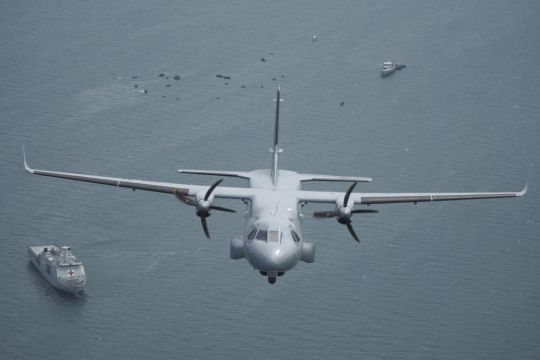Divers found parts of the cockpit voice recorder as more personnel joined the search for wreckage and victims from an Indonesian plane that crashed last weekend in the Java Sea with 62 people on board.
The aerial search for the crashed Sriwijaya Air jet was being expanded as well, said National Search and Rescue Agency mission coordinator Rasman, who uses one name.
More than 4,000 search and rescue personnel are supported by 14 airplanes, 62 ships and 21 inflatable boats.
They are using an underwater metal detector and remotely operated vehicle to search for human remains, the cockpit voice recorder and more wreckage.
Divers narrowed the search for the black box, or cockpit voice recorder, after finding some of its parts.
“We have found the casing, the beacon and the CVR batteries.
“We need to search for the memory unit,” the commander of the navy’s First Fleet Command, Abdul Rasyid, said.
“We hope it will be not far from them,” he said.

Investigators have downloaded information from the plane’s flight data recorder, which was recovered earlier this week.
“There are 330 parameters and everything is in good condition. We are learning about it now,” said Soerjanto Tjahjono, chairman of the National Transport Safety Committee.
Families of those on board have been providing DNA samples to help identify them.
National Police spokesperson Rusdi Hartono said 12 of the 62 victims had been identified as of Thursday, including a flight attendant and an off-duty pilot.
The committee has said the crew did not declare an emergency or report any technical problems before the plane plunged into the sea minutes after taking off from Jakarta in heavy rain.
They said it broke apart upon impact with the water, ruling out a midair explosion, because the debris field is concentrated and engine parts indicate it was running until impact.
The 26-year-old Boeing 737-500 was out of service for almost nine months last year because of flight cutbacks caused by the coronavirus pandemic.
The airline and Indonesian officials say it underwent inspections, including for possible engine corrosion that could have developed during the layoff, before it resumed commercial flying in December.
Indonesia’s aviation industry grew quickly after the nation’s economy was opened following the fall of dictator Suharto in the late 1990s.
Safety concerns led the United States and the European Union to ban Indonesian carriers for years, but the bans have since been lifted due to better compliance with international aviation standards.







